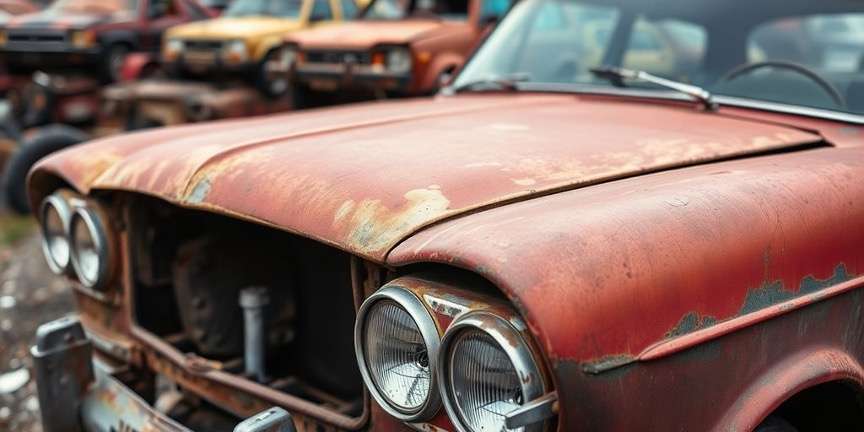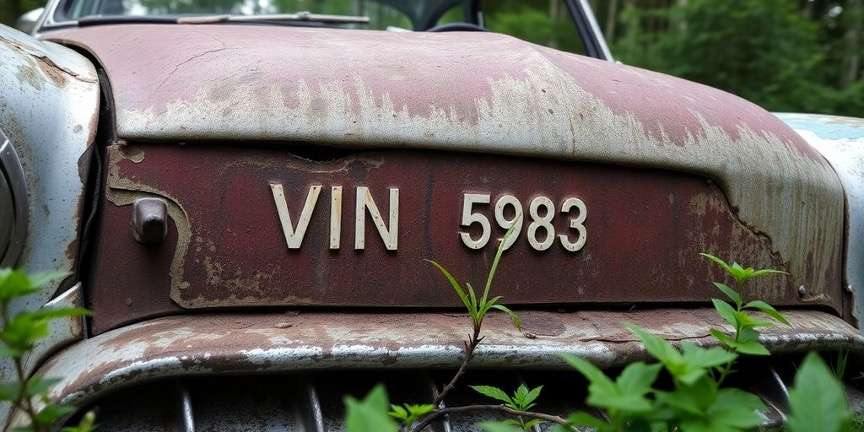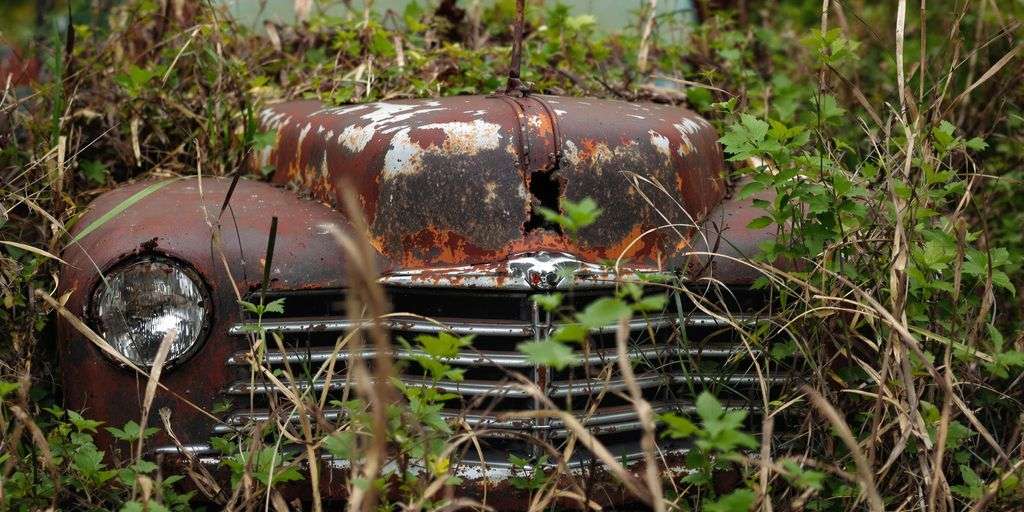Key Takeaways
- A missing VIN can complicate selling or insuring your car, but it's not the end of the road.
- Check your state laws for guidance on handling VIN-less vehicles.
- Consider contacting local authorities to explore options for getting a state-assigned VIN.
- Selling a car without a VIN might lower its value, but some buyers are still interested.
- Using parts from a VIN-less car can be an alternative to selling the whole vehicle.
Understanding the Importance of a VIN Number
Why VIN Numbers Matter
A Vehicle Identification Number (VIN) is like a car's fingerprint. It's a unique code that identifies each vehicle. Without a VIN, tracking a car's history becomes nearly impossible. This number is crucial for many reasons, such as verifying ownership, checking for recalls, and accessing the vehicle's service history. When buying or selling a car, the VIN helps ensure that the vehicle has a clean background and isn't stolen or involved in fraudulent activities.
Legal Implications of Missing VIN
The absence of a VIN can lead to a host of legal headaches. Legally, a car without a VIN might not be recognized as roadworthy, which can complicate registration and insurance processes. In many places, it's illegal to drive or sell a vehicle without a VIN. This can lead to fines or other legal penalties. Plus, if there's ever a dispute about the car's ownership, having no VIN can make it difficult to prove who the rightful owner is.
How VIN Affects Car Valuation
The VIN plays a significant role in determining a car's value. When appraisers assess a vehicle, they use the VIN to check its history, including past accidents, repairs, and title status. A car with a clear VIN history usually has a higher market value compared to one with a murky or missing VIN history. For junk cars, even though they might not be worth much, a VIN can still provide insights into the parts' value or potential restoration worth.
Steps to Take When Your Junk Car Lacks a VIN

Initial Assessment of Your Vehicle
First things first, give your car a thorough look-over. Check every nook and cranny for any trace of a VIN. Sometimes, VINs can be tucked away in unexpected spots like under the hood or on the engine block. If you’re lucky, you might find it on an old insurance document or registration paperwork. This step is crucial because having the VIN simplifies the entire process.
Contacting Local Authorities
If your car truly lacks a VIN, it's time to reach out to your local DMV or law enforcement. They can guide you on what to do next. They might have specific procedures for handling vehicles without VINs, such as verifying ownership or issuing a temporary identification. Be prepared to provide any documentation you have that proves you own the car.
Exploring Alternative Identification Methods
When the VIN is nowhere to be found, consider alternative methods to identify your vehicle. Some states allow for the use of other identifying numbers, like the chassis or engine number. You might also explore the option of obtaining a state-assigned VIN, which can legitimize your car for future transactions. This step can be a bit of a hassle, but it’s often necessary to avoid legal headaches down the road.
Dealing with a car that doesn't have a VIN can feel overwhelming, but with the right steps, you can navigate the situation effectively. Remember, patience and persistence are key.
Legal Considerations for Cars Without VINs

State Regulations on VIN-less Vehicles
When your car doesn't have a VIN, you're stepping into a tricky legal area. Each state has its own set of rules about how to handle vehicles without VINs. Some states might allow you to apply for a new VIN, while others could make it more complicated. It's crucial to check with your local DMV to understand what's required. They can guide you on whether you need specific paperwork or inspections. Keep in mind that driving without valid registration can lead to serious consequences, like fines or even having your car impounded.
Obtaining a State-Assigned VIN
If your car is missing its VIN, you might be able to get a new one assigned by the state. This process often involves filling out a bunch of forms and possibly having your car inspected. The goal is to prove that the car isn't stolen and that you have the right to own it. Once everything checks out, the state might issue you a new VIN. This new number will help legitimize your vehicle, making it easier to register and insure.
Potential Legal Risks
Owning a car without a VIN can be risky. Without a VIN, proving ownership becomes challenging, and selling the car can be nearly impossible. Plus, if your car's history is unclear, you might unknowingly be driving a stolen vehicle. These risks can lead to legal troubles, so it's important to address any VIN issues as soon as possible. You don't want to end up in a situation where you're facing legal action because of something that could have been resolved earlier.
If you're dealing with a VIN-less car, act quickly to sort it out. The longer you wait, the more complicated things can become, and the last thing you want is to get caught up in a legal mess. Being proactive can save you a lot of headaches down the road.
Selling a Junk Car Without a VIN
Finding Buyers for VIN-less Cars
Selling a junk car without a VIN can feel a bit like trying to sell a mystery box. But don't worry, there are buyers out there. Start by checking with local junkyards or scrap dealers. Many of them are used to dealing with cars that have missing paperwork. They might offer you a lower price, but it's a good way to get rid of the vehicle quickly. Make sure to explain the situation clearly to avoid any misunderstandings.
Negotiating the Sale Price
When it comes to negotiating the price, be prepared for some back-and-forth. Without a VIN, the car's history is a blank slate, which can make buyers wary. Highlight any positive aspects of the car, like working parts or recent repairs, to make a stronger case. Remember, every part of the car has value, so don't settle for the first offer if it seems too low.
Documenting the Sale Properly
Even without a VIN, it's crucial to document the sale properly. This protects both you and the buyer from potential legal issues down the line. Write up a simple bill of sale that includes the car's make, model, and any other identifying details you can provide. Both parties should sign it, and each should keep a copy. This step is important to ensure a smooth transaction and can prevent future headaches.
Selling a car without a VIN can be tricky, but with the right approach, it's entirely doable. Always be upfront with buyers about the situation and make sure you have all the necessary paperwork to protect yourself.
Alternative Solutions for VIN-less Junk Cars
Using Parts for Other Vehicles
Got a knack for tinkering? If your junk car doesn't have a VIN, consider salvaging parts. Many components can still hold value, especially if they're in decent shape. Here's a quick rundown on what you can do:
- Identify Valuable Parts: Look for parts like the engine, transmission, or even smaller components like mirrors and lights.
- Research Market Demand: Check online platforms to see what parts are in demand and how much they're selling for.
- List and Sell: Clean the parts up, take clear photos, and write detailed descriptions before listing them for sale.
Donating the Car to Charity
If dismantling isn't your thing, donating the car might be a better option. Many charities accept cars without VINs, using them for parts or scrap metal. This not only clears your space but can also be a nice tax write-off.
- Find a Reputable Charity: Make sure the organization is legitimate and accepts vehicles without VINs.
- Understand the Process: Some charities offer free towing and handle all the paperwork for you.
- Get a Receipt: Ensure you receive a donation receipt for tax purposes.
Recycling the Vehicle Responsibly
When all else fails, recycling is a responsible choice. Auto recyclers can safely dispose of your car, ensuring that hazardous materials are handled properly.
- Contact Local Recyclers: Reach out to see who accepts cars without VINs.
- Arrange Towing: Many recyclers offer free towing services.
- Receive Compensation: While it might not be much, some recyclers offer cash for the scrap metal.
Recycling your vehicle not only helps the environment but also ensures that every part of your car is put to good use. It's a win-win situation.
Getting a New VIN for Your Junk Car
Applying for a New VIN
So, your junk car doesn't have a VIN. What do you do? First up, you'll need to apply for a new VIN through your state's Department of Motor Vehicles (DMV). The process can vary by state, but generally, you'll have to fill out some forms and provide proof of ownership. This might include a bill of sale or an affidavit explaining why the VIN is missing. Make sure to check the specific requirements for your state since they can differ quite a bit.
Costs Involved in VIN Assignment
Getting a new VIN isn't free. You'll likely have to pay a fee, which can range from $50 to $200 depending on your location and the specifics of your situation. Some states might also require an inspection of the vehicle, which could add to the cost. It's a good idea to budget for these expenses so you're not caught off guard.
Timeframe for Receiving a New VIN
Don't expect to get your new VIN overnight. The process can take anywhere from a few weeks to a couple of months. It all depends on how busy your local DMV is and whether they need any additional documentation from you. Patience is key here, so it's best to start the process as soon as you know you need a new VIN.
Applying for a new VIN can be a bit of a hassle, but it's a necessary step if you want to legally sell or insure your car. Make sure to gather all the required documents ahead of time to avoid any delays.
Insurance and VIN-less Vehicles
Challenges in Insuring VIN-less Cars
Insuring a car without a VIN is like trying to build a puzzle with missing pieces. Insurance companies rely heavily on VINs to identify vehicles, assess risks, and determine coverage options. Without a VIN, insurers may refuse to provide coverage, as they can't verify the car's history or confirm its legitimacy. This can leave owners in a lurch, unable to secure the necessary protection for their vehicle.
Working with Insurance Companies
If you're determined to insure a VIN-less car, be prepared for some hurdles. Start by contacting various insurance agents to explain your situation. Some may offer specialized policies for unique cases, but expect to pay higher premiums. It's crucial to provide any alternative documentation you have, like bills of sale or registration papers, to help establish the vehicle's identity.
- Contact multiple insurance agents to find one willing to work with VIN-less cars.
- Be ready to pay higher premiums for specialized coverage.
- Offer alternative documents to support your vehicle's identity.
Understanding Coverage Limitations
Even if you manage to secure insurance, the coverage might not be as comprehensive as you'd hope. Policies for VIN-less vehicles often come with significant limitations. For instance, collision or theft coverage might be unavailable, leaving you exposed to potential losses. It's essential to thoroughly review the policy terms and understand what is and isn't covered.
Insuring a car without a VIN can be a tricky business, but with persistence and the right approach, it's not impossible. Always weigh the costs against the benefits to decide if it's worth pursuing.
Wrapping It Up: Dealing with a VIN-Less Junk Car
So, you've got a junk car without a VIN, and you're wondering what to do next. It's not the end of the world, but it does take a bit of patience and legwork. First, check every nook and cranny for that elusive number—it might be hiding somewhere unexpected. If it's truly gone, your next step is to reach out to your local DMV. They can guide you on how to get a new VIN assigned, which might involve some paperwork and inspections. Remember, selling the car without a VIN can be tricky, but not impossible. You might need to sell it for parts or scrap. Whatever you decide, make sure to follow the legal steps to avoid any future headaches. Good luck, and may your driveway soon be free of that old clunker!
Frequently Asked Questions
What is a VIN number and why is it important?
A VIN, or Vehicle Identification Number, is like a car's fingerprint. It's a unique code that identifies a specific vehicle. VINs are important because they help track recalls, registrations, warranty claims, thefts, and insurance coverage.
Can I sell my junk car without a VIN number?
Yes, you can sell a junk car without a VIN, but it might be a bit tricky. Some buyers may be hesitant, and the price offered might be lower. It's best to talk to local junkyards or car recyclers who might accept it.
How can I find the VIN number if it's missing?
If the VIN is missing, check places like the dashboard, driver's side door, or old insurance documents. If it's still not found, contact your local DMV for advice on alternative identification methods.
What should I do if I can't find my car's VIN number?
If you can't find your car's VIN, reach out to the DMV or local authorities. They might help you get a state-assigned VIN, especially if the car was custom-built or restored.
Are there legal issues with cars that don't have a VIN?
Yes, there can be legal issues. Without a VIN, it might be harder to prove ownership or register the car. Each state has different rules, so check with your local DMV to understand the requirements.
Is it possible to get a new VIN for my car?
Yes, you can apply for a new VIN through your state's DMV. This usually involves verifying ownership and the car's history. There might be a fee, and the process can take some time.



